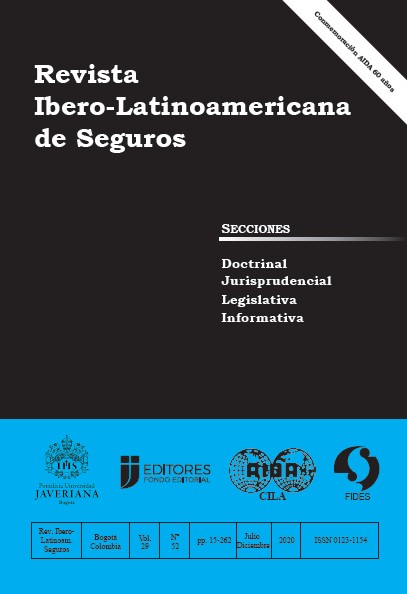Abstract
Brazil has very recent laws that regulate the flow of information that technology provides, with rules and consequences for those who fail to comply, whether in the civil or criminal field. However, the world scenario points to an increase in the number of cyber attacks and that puts Brazil in a prominent position in vulnerability to these attacks. Based on that, there is a reflection on the worsening of risk in cyber data protection and liability insurance contracts and the duty of information inherent in all insurance contracts.
BRASIL. Lei 10.406, de 10 de janeiro de 2020. Código Civil, 2002, Disponível em http://www.planalto.gov.br/ccivil_03/leis/2002/l10406.htm.
BRASIL. Lei 13.709, de 14 de agosto de 2018. Lei Geral de Proteção de Dados Pessoais (LGDP), 2018, Disponível em http://www.planalto.gov.br/ccivil_03/_ato2015-2018/2018/lei/l13709.htm.
BRASIL. Lei 12.965, de 23 de abril de 2014. Marco Civil da Internet, 2014, Disponível em http://www.planalto.gov.br/ccivil_03/_ato2011-2014/2014/lei/l12965.htm.
BRASIL. Lei 12.737, de 30 de novembro de 2012, Disponível em http://www.planalto.gov.br/ccivil_03/_ato2011-2014/2012/lei/l12737.htm.
BONTIS, N. Assessing knowledge assets: a review of the models used to measure intelectual capital. Working paper, Queen’s Managemente Research Centre for Knowledge-Based Enterproses. 2000.
EDVINSSON, L.; MALONE, M. S.S.. Capital intelectual: descobrindo o valor real de sua empresa pela identificação de seus valores interiores. São Paulo: Makron Books, 1998.
LEV, B. Intangibles: management, seasurement and reporting. Brookings Institution Press, Washington, D.C.. 2001.
PETERSEN, Luiza Moreira. O risco no contrato de seguro. São Paulo: Roncarati. 2018. p. 149.
SCHIAVO, Carlos A. Contrato de seguro – Reticencia y agravación del riesgo. Buenos Aires: Hammurabi, 2006. p. 265.
SCHNORRENBERGER, D. O alvorecer do capital intelectual. Revista Brasileira de Contabilidade - RBC, N. 139: Janeiro-Fevereiro, 2003.
Weske, M. Concepts, Languages, Architectures. V. 14. Springer, 2007.
This journal is registered under a Creative Commons Attribution 4.0 International Public License. Thus, this work may be reproduced, distributed, and publicly shared in digital format, as long as the names of the authors and Pontificia Universidad Javeriana are acknowledged. Others are allowed to quote, adapt, transform, auto-archive, republish, and create based on this material, for any purpose (even commercial ones), provided the authorship is duly acknowledged, a link to the original work is provided, and it is specified if changes have been made. Pontificia Universidad Javeriana does not hold the rights of published works and the authors are solely responsible for the contents of their works; they keep the moral, intellectual, privacy, and publicity rights.
Approving the intervention of the work (review, copy-editing, translation, layout) and the following outreach, are granted through an use license and not through an assignment of rights. This means the journal and Pontificia Universidad Javeriana cannot be held responsible for any ethical malpractice by the authors. As a consequence of the protection granted by the use license, the journal is not required to publish recantations or modify information already published, unless the errata stems from the editorial management process. Publishing contents in this journal does not generate royalties for contributors.


